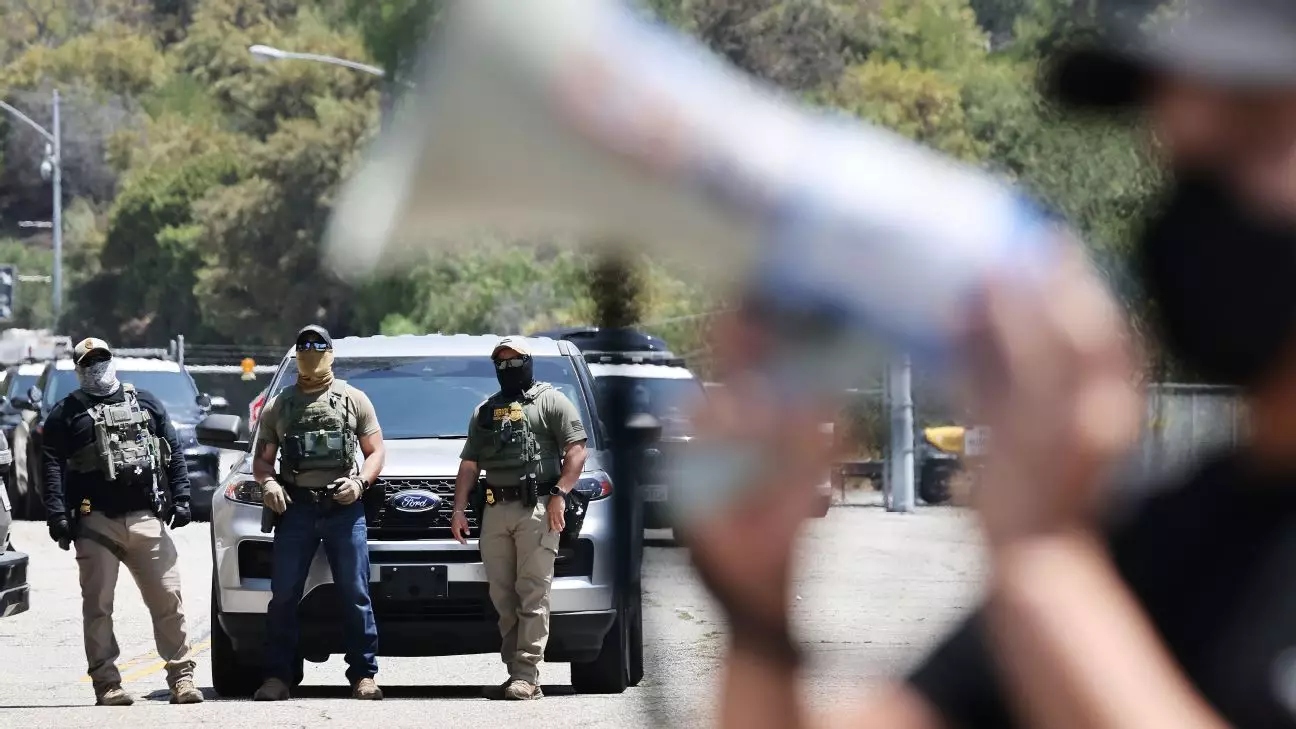In a dramatic confrontation that has sparked intense backlash across Los Angeles, federal agents from the Department of Homeland Security descended upon Dodger Stadium early on a Thursday morning. This unannounced presence sent waves of outrage through social media platforms, igniting protests against the government’s immigration enforcement tactics. Instead of a celebratory atmosphere typically associated with baseball games, the grounds of the stadium were overshadowed by the specter of federal intervention, raising questions about the ongoing struggle for immigrant rights and public safety.
As the day unfolded, it became clear that the situation at Dodger Stadium was more than just an enforcement action; it was emblematic of the broader societal tensions that have been simmering in communities across the nation. The sight of unmarked federal vehicles at such a popular venue was enough to rally protesters who sought to make their voices heard amidst the pervasive anxiety surrounding immigration policies. The Los Angeles Dodgers, who had initially planned to launch initiatives aimed at supporting local immigrant communities, found themselves caught in a whirlwind of political controversy and public scrutiny.
The Dodgers’ Response: A Delayed Initiative
Dodgers president Stan Kasten made a statement amidst the chaos, indicating that due to the day’s unfortunate events, the organization would postpone announcing their support initiatives for immigrant communities. The postponement was not merely a bureaucratic decision; it was a reflection of the unpredictable dynamics at play when federal law enforcement steps into the public sphere. By deciding to delay the announcement, the Dodgers communicated a commitment to approach the discussion carefully and responsibly, recognizing that their engagement with the immigrant community could either strengthen bonds or create divisions.
The Dodgers’ initial reluctance to publicly address the sweeping immigration enforcement actions happening around them drew criticism, particularly from city leaders and advocacy groups. The delicate balance they had to strike was further complicated when chaos erupted outside their stadium. The very idea that federal enforcement was operating within a space so central to the community underscored a chilling reality faced by many immigrants: they are often pursued even in their most cherished gathering places.
Confusion and Communication Chaos
Adding to the confusion surrounding the event, U.S. Immigration and Customs Enforcement (ICE) initially denied their presence at Dodger Stadium, instead claiming that the agents spotted were with U.S. Customs and Border Protection (CBP). This discrepancy highlights a concerning aspect of modern governmental operations where miscommunication and contradictory narratives can further aggravate already skeptical communities. The attempt by agencies to distance themselves from one another parallels the way many individuals attempt to dissociate themselves from the harsh realities of immigration enforcement—hoping to bypass accountability.
As the community grapples with a growing sense of unease, protesting citizens took to the streets, some blocking freeways and expressing their discontent through direct, albeit disruptive, actions. Their grievances were met with force, as police deployed tear gas and rubber bullets to disperse crowds. This reaction further escalated the tension, bringing to light the stark contrast between those advocating for immigration reform and law enforcement’s stringent responses.
The Larger Picture: A Community in Crisis
Ironically, while protests erupted outside the stadium, immigration enforcement was reportedly ongoing throughout Los Angeles, targeting various community spaces, including libraries and local businesses. This pervasive presence creates an atmosphere of fear among immigrants, who now see their everyday routines intruded upon by governmental oversight. An environment like this leads many to question where they can find solace, safety, and community support.
The Dodgers may have intended to be a beacon of support, yet they found themselves portrayed as a reluctant participant in a national dialogue about immigration, safety, and community well-being. Their planned initiatives to support the immigrant community were put on hold, but the real question remains: when they do ultimately announce these initiatives, will it be enough to mend the frayed bonds within their community?
In a time rife with division, the team’s hesitance to fully advocate for immigrant rights may have lasting repercussions, not only for its relationship with those communities but also for its image. As public venues are thrust into the center of political conflict, the actions taken today by influential organizations like the Dodgers can either promote unity or perpetuate discord in a city where everyone deserves to feel they belong.


Leave a Reply